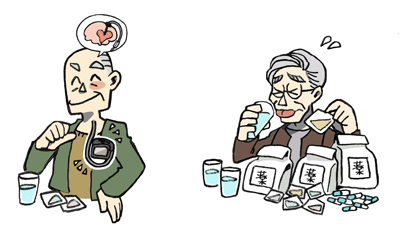- HOME
- For Patients
- Parkinson disease
- Surgical treatment of Parkinson disease
Parkinson disease
- About Parkinson disease
- Symptom of Parkinson disease
- Other symptoms of Parkinson's disease
- Cause of Parkinson disease
- Diagnosis of Parkinson disease
- Treatment of Parkinson disease
- Details of surgical treatment
- Surgical treatment of Parkinson disease
- Timing of surgery
- About our team
Surgical treatment of Parkinson disease
Recover your former self through brain surgery
During the progression of Parkinson's disease that has mainly been treated by medication, the addition of surgical treatment such as deep brain stimulation (DBS) offers the chance to change the natural course of this condition. Brain surgery (DBS) will never be the initial choice of treatment for Parkinson's disease. Generally, the number of patients considering DBS increases at the point when drugs begin to lose efficacy and they start needing to take several different drugs; that is, after they have had Parkinson's disease for around 8-10 years. The period around 8-12 years after the onset of Parkinson's disease, when the side effects of medication also become a more pressing concern, has come to be regarded as a good time to consider DBS.
What aspect of Parkinson's disease is improved by DBS? In a nutshell, this surgery "raises the level of the 'off' state". DBS performed by a surgeon cannot cure Parkinson's disease, or halt its course. However, it can reduce the number of times medication needs to be taken, as well as the number of different medications used. Patients who are able to decrease the number of types of drug they take may also be able to reduce the severity of side effects of medications that are added later. That is, by undergoing DBS 8-12 years after the onset of Parkinson's disease, it is possible to cause it to revert to a previous stage of its natural course, offering the chance to recover one's former self. As described above, DBS cannot cure Parkinson's disease, or halt its course. What it can do, through its inclusion in the progress of Parkinson's disease, is to offer the possibility of extending the period in which the individual can live in as stable a condition as possible.
How does the inclusion of DBS change the natural course of Parkinson's disease? The important point to understand is that DBS has been shown to exert an effect over a period lasting around 5-7 years. During this 5- to 7-year period, treatment reverts to that used at an earlier stage, offering the chance to recover one's former self.

However, the progress of the disease and the effectiveness of treatment vary from patient to patient. Not all patients with Parkinson's disease fit the situation described above. Rather, this represents a simple way of describing the overall experience of a large number of patients in the past. Understand that the progress of the disease will differ between patients. Please read the next page.







